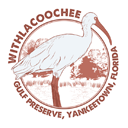 A Super Blue Blood Moon as seen from the Preserve’s Observation Tower. This rare astronomical event triplet happened in the early morning of January 31, 2018.
A Super Blue Blood Moon as seen from the Preserve’s Observation Tower. This rare astronomical event triplet happened in the early morning of January 31, 2018.
A blue moon is the second full moon of a calendar month. The moon rotates around the Earth in a 28-day cycle. So a blue moon happens occasionally. Hence the phrase, “once in a blue moon.”
A super moon happens when the moon is especially close to the Earth, making it appear larger (up to 17%) and brighter than usual. This occurs because the moon’s orbit around the Earth is an ellipse. Which at times brings the moon thousands of miles closer.
Coinciding with the above two events was a total lunar eclipse. As the moon entered Earth’s shadow the reflected light had a reddish tint… a blood moon.










 The Rescue Program responds to sick, injured, and deceased marine mammals in Levy, Dixie, and Taylor counties of the Big Bend. They coordinate rescues of live animals and, if possible, transport them to rehabilitation facilities. They also perform necropsies (animal autopsies) on deceased marine animals to determine their cause of death and learn more about their anatomy, physiology, and the health of their ecosystem.
The Rescue Program responds to sick, injured, and deceased marine mammals in Levy, Dixie, and Taylor counties of the Big Bend. They coordinate rescues of live animals and, if possible, transport them to rehabilitation facilities. They also perform necropsies (animal autopsies) on deceased marine animals to determine their cause of death and learn more about their anatomy, physiology, and the health of their ecosystem. The Audubon Society has a free, award-winning field guide app. Versions are available for Apple iOS, Android, and Amazon Kindle. To learn more visit:
The Audubon Society has a free, award-winning field guide app. Versions are available for Apple iOS, Android, and Amazon Kindle. To learn more visit:  The Friends of the WGP want to welcome a new chapter of the Audubon Society to Levy Country. Cedar Keys Audubon is the newest chapter in the Audubon Florida network. To find out more visit them at
The Friends of the WGP want to welcome a new chapter of the Audubon Society to Levy Country. Cedar Keys Audubon is the newest chapter in the Audubon Florida network. To find out more visit them at